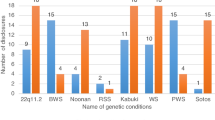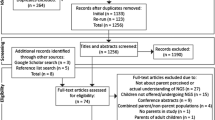Abstract
Sex chromosome trisomies (SCTs) are frequently diagnosed, both prenatally and postnatally, but the highly variable childhood outcomes can leave parents at a loss on whether, when and how to disclose genetic status. In two complementary studies, we detail current parental practices, with a view to informing parents and their clinicians. Study 1 surveyed detailed qualitative data from focus groups of parents and affected young people with either Trisomy X or XYY (N=34 families). These data suggested that decisions to disclose were principally affected by the child’s level of cognitive, social and emotional functioning. Parents reported that they were more likely to disclose when a child was experiencing difficulties. In Study 2, standardised data on cognitive, social and emotional outcomes in 126 children with an SCT and 63 sibling controls highlighted results that converged with Study 1: logistic regression analyses revealed that children with the lowest levels of functioning were more likely to know about their SCT than those children functioning at a higher level. These effects were also reflected in the likelihood of parents to disclose to unaffected siblings, schools and general practitioners. In contrast, specific trisomy type and the professional category of the clinician providing the original diagnosis did not affect likelihood of disclosure. Our study emphasises the complex weighing up of costs and benefits that parents engage in when deciding whether to disclose a diagnosis.
Similar content being viewed by others
Log in or create a free account to read this content
Gain free access to this article, as well as selected content from this journal and more on nature.com
or
References
Crandall BF, Lebherz TB, Rubinstein L et al: Chromosome findings in 2500 second trimester amniocenteses. Am J Med Genet 1980; 5: 345–356.
Linden MG, Bender BG, Robinson A : Intrauterine diagnosis of sex chromosome aneuploidy. Obstet Gynecol 1996; 87: 468–475.
Jacobs PA, Melville M, Ratcliffe S, Keay AJ, Syme J : A cytogenetic survey of 11 680 newborn infants. Ann Hum Genet 1974; 37: 359–376.
Morris JK, Alberman E, Scott C, Jacobs P : Is the prevalence of Klinefelter syndrome increasing? Eur J Hum Genet 2008; 16: 163–170.
Thompson M, Thompson J, McInnis R, Willard H : Genetics in Medicine. Philadelphia, PA, USA: WB Saunders, 1991.
Abramsky L, Hall S, Levitan J, Marteau TM : What parents are told after prenatal diagnosis of a sex chromosome abnormality: interview and questionnaire study. BMJ 2001; 322: 463–466.
Jacobs P, Brunton M, Melville MM : Aggressive behaviour, mental sub-normality and the XYY male. Nature 1965; 208: 1351–1352.
Maclean N, Mitchell JM : A survey of sex-chromosome abnormalities among 4514 mental defectives. Lancet 1962; 1: 293–296.
Theilgaard A : Aggression and the XYY personality. Int J Law Psychiatry 1983; 6: 413–421.
Leggett V, Jacobs P, Nation K, Scerif G, Bishop DVM : Neurocognitive outcomes of individuals with a sex chromosome trisomy: XXX, XYY, or XXY: a systematic review. Dev Med Child Neurol 2010; 52: 119–129.
Netley C : Summary overview of behavioural development in individuals with neonatally identified X and Y aneuploidy. Birth Defects Orig Artic Ser 1986; 22: 293–306.
Pennington BF, Bender B, Puck M, Salbenblatt J, Robinson A : Learning disabilities in children with sex chromosome anomalies. Child Dev 1982; 53: 1182–1192.
Ratcliffe S : Long-term outcome in children of sex chromosome abnormalities. Arch Dis Child 1999; 80: 192–195.
Theilgaard A : A psychological study of the personalities of XYY and XXY men. Acta Psychiatr Scand 1984; 69: 1–133.
Bender BG, Berch DB: Sex Chromosome Abnormalities and Human Behavior. Boulder, CO, USA: Westview Press and the American Assosciation for the Advancement of Science, 1990, pp 1–19.
Bishop DVM, Jacobs PA, Lachlan K et al: Autism, language and communication in children with sex chromosome trisomies. Arch Dis Child 2011; 96: 954–959.
Metcalfe A, Coad J, Plumridge GM, Gill P, Farndon P : Family communication between children and their parents about inherited genetic conditions: a meta-synthesis of the research. Eur J Hum Genet 2008; 16: 1193–1200.
Gallo AM, Angst DB, Knalfl KA : Disclosure of genetic information within families. Am J Nurs 2009; 109: 65–69.
Gallo AM, Angst D, Knafl Ka, Hadley E, Smith C : Parents sharing information with their children about genetic conditions. J Pediatr Health Care 2005; 19: 267–275.
Villanueva A, Rebar R : Triple-X syndrome and premature ovarian failure. Obstet Gynecol 1983; 62: 70–73.
Holland CM : 47, XXX in an adolescent with premature ovarian failure and autoimmune disease. J Pediatr Adolesc Gynecol 2001; 14: 77–80.
Sugawara N, Maeda M, Manome T, Nagai R, Araki Y : Patients with 47, XXX karyotype who experienced premature ovarian failure (POF): two case reports. Reprod Med Biol 2013; 9–11.
Conners CK: Conners‘ Rating Scales-Revised. North Tonawanda, NY, USA: Multi-Health Systems, 2001, pp 83–98.
Boyatzis RE : Transforming Qualitative Information: Thematic Analysis and Code Development. London, UK: Sage, 1998.
Braun V, Clarke V : Using thematic analysis in psychology. Qual Res Psychol 2006; 3: 77–101.
Dennis A, Howell S, Cordeiro L, Tartaglia N : ‘How should I tell my child?’ Disclosing the diagnosis of sex chromosome aneuploidies. J Genet Couns 2015; 24: 88–103.
Bishop DVM, Scerif G : Klinefelter syndrome as a window on the aetiology of language and communication impairments in children: the neuroligin-neurexin hypothesis. Acta Paediatr 2011; 100: 903–907.
Robinson A, Bender BG, Linden MG : Decisions following the intrauterine diagnosis of sex chromosome aneuploidy. Am J Med Genet 1989; 34: 552–554.
Holmes-Siedle M, Ryynanen M, Lindenbaum RH : Parental decisions reagrding termination of pregnancy following prenatal detection of sex chromosome abnormality. Prenat Diagn 1987; 7: 239–244.
Sparrow SS, Cicchetti DV, Balla DA : Vineland Adaptive Behaviour Scales: Second Edition, Survey Interview Form/Caregiver Rating Form. Livonia, MN, USA: Pearson Assessments, 2005.
Bishop DVM : Children’s Communication Checklist, Version 2. London, UK: Pearson, 2003.
Goodman R : Strengths and Difficulties Questionnaire 1997. Available at http://www.sdqinfo.com/a0.html.
USAID Center for Development Information and Evaluation: ‘Conducting Focus Group Interviews.’ Performance Monitoring and Evaluation Tips 1996, Available at https://www.ndi.org/files/USAID%20Guide_Conducting%20Focus%20Groups.pdf.
Acknowledgements
Special thanks to the staff at Unique for their support in organising the Study Days, to Dr Karen Melham for assistance with focus groups and to all the families who gave up their time to participate in the study, without whom this would not have been possible.
Author information
Authors and Affiliations
Corresponding author
Ethics declarations
Competing interests
The authors declare no conflict of interest.
Additional information
Supplementary Information accompanies this paper on European Journal of Human Genetics website
Supplementary information
Rights and permissions
About this article
Cite this article
Gratton, N., Myring, J., Middlemiss, P. et al. Children with sex chromosome trisomies: parental disclosure of genetic status. Eur J Hum Genet 24, 638–644 (2016). https://doi.org/10.1038/ejhg.2015.168
Received:
Revised:
Accepted:
Published:
Issue date:
DOI: https://doi.org/10.1038/ejhg.2015.168
This article is cited by
-
Understanding the phenotypic spectrum and family experiences of XYY syndrome: Important considerations for genetic counseling
Journal of Community Genetics (2023)
-
Healthcare and support experiences of adolescents and young adults diagnosed with 47,XXY, 47,XXX, and 48,XXYY
Journal of Community Genetics (2023)
-
Communicating the diagnosis of Klinefelter syndrome to children and adolescents: when, how, and who?
Journal of Community Genetics (2022)



